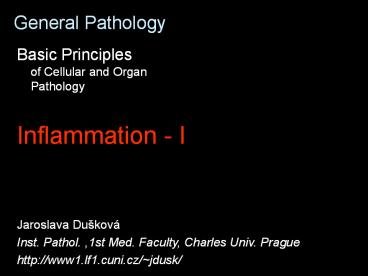General Pathology - PowerPoint PPT Presentation
Title:
General Pathology
Description:
Basic Principles of Cellular and Organ Pathology Inflammation - I Jaroslava Du kov Inst. Pathol. ,1st Med. Faculty, Charles Univ. Prague http://www1.lf1.cuni.cz ... – PowerPoint PPT presentation
Number of Views:108
Avg rating:3.0/5.0
Title: General Pathology
1
General Pathology
- Basic Principles of Cellular and Organ Pathology
- Inflammation - I
Jaroslava Dušková Inst. Pathol. ,1st Med.
Faculty, Charles Univ. Prague http//www1.lf1.cuni
.cz/jdusk/
2
Inflammation
- Definition
- complex reaction
- of organism to damage
- (aim homeostasis maintenance)
3
Inflammation
- Sense
- defensive agent elimination
- reparative damage reparation
4
Inflammation - Classification
- Time view
- acute (days)
- subacute (weeks)
- chronic (months-years)
5
Inflammation - Classification
- Causes
- nonliving
- physical
- chemical
- living
- viral
- bacterial
- mycotic
- parasitic
- AUTOIMMUNE
6
Inflammation Celsus features
- rubor
- tumor
- calor
- dolor
- functio laesa
7
Phases of Inflammatory Response
- alteration
- exsudation
- proliferation
8
Phases of Inflammatory Response
Alteration
Proliferation
Exsudation
9
Phases of Inflammatory Response
Proliferation
Alteration
Exsudation
10
Vascular Changes in Inflammation
- Flux hyperemia - axonal reflex
- Peristatic hyperemia
- Stasis
- Increased permeability - exsudation
- Inflammatory edema
11
Active Hyperemia
- vasodilatation
- slowing of the circulation
- increased microvasculature permeability
leakage - ----------
- leucocyte emigration
12
Mast Cell ruling the process
- Degranulation (immediate response)
- histamin-vasodilation-permeability-exsudation
- neutrofil chemotactic factor (micro)fagocytosis
- eosinophil chemotactic factor -modulation of the
vascular effect - Synthesis (long-term response)
- leukotriens (SRS-A) vasodilation-permeability-exs
udation - prostaglandins - vasodilation-permeability-exsudat
ion- PAIN
13
Active Hyperemia
- vasodilatation
- leakage
- Chemical mediators
- Cells histamine , serotonin, catecholamins,
lysosomal enzymes - Plasma complement, kinin system,
coagulation/fibrinolysis system
14
Active Hyperemia
- vasodilatation
- slowing of the circulation
- increased microvasculature permeability -
leakage - leucocyte emigration
- chemotaxis
- soluble bact. products
- complement components esp. C5a
- products of lipoxygenase pathway of arachidonic
acid (esp.leukotriene B4)
15
Main Inflammatory Mediators
- Vasodilation prostaglandins, NO
- Permeability vasoactive amins, C3,C5,
bradykinin - Chemotaxis C5a, bacterial products, leucotriens,
cytokins - Fever interleukin 1,6, TNF, prostaglandins
- Pain prostaglandins, bradykinin
- Tissue damage lysosomal enzymes
16
Mechanisms and Morphological Features of Immune
Reaction
17
Mechanisms of Immune Response
- nonspecific
- antigen specific
- humoral
- cellular
18
Mechanisms of Immune Response
- nonspecific
- PHAGOCYTOSIS
- bactericid substances (lysozym)
- complement
- interferon
- proteins distinguishing general microbial
structures
19
Cytokines
- Def.
- polypeptides and proteins - regulatory molecules
participating by autocrine, paracrine
endocrine function in homeostasis maintenance
20
Cytokines
- Types
- growth fcs.
- colony stim. fcs.
- chemokins (interleukins)
- TNFa, TNF ß LT
- interferons
- Source
- macrophages
- APC
- T- lympho
21
Interleukin 4
- Th2 stimulation antibody mediated immune
response - Th1 interferon ? suppresion
- inhibition of the T-lymphocytes proliferation
- inhibition of TNF a Il6 secretion
22
Mechanisms of Immune Response
- antigen specific
- humoral B lymphocytes
- cellular T lymphocytes
- INTERACTION
- B-lymphoTh affinity maturation plasmocyte
23
Inflammatory cells
- neutrophile granulocytes
- eosinophil granulocytes
- basophil granulocytes heparinocytes
- lymphocytes plasmocytes
- monocytes macrophages
- erythrocytes
- platelets
24
Heparinocytes
- IgE receptors
- mediators production (heparin, histamin,
serototnin, catecholamins) - cytokin production IL4, TNF a
- chemotactic factors for neutrophils
eosinophils
25
Heparinocyte degranulation
- physical
- heat, mech.,UV light,x-rays
- chemical
- venoms, enzymes
- immune
- IgE binding, complement
26
Neutrophilic granulocytes
- pavementing (selectins, integrins)
- emigration (chemotactic factors from bacteria,
complement 3a, 5a, kinins, histamin.) - fagocytosis (both non specific without
opsonisation and specific IgG compl.)
27
Neutrophilic granulocytes
- ingestion digestion of bacteria
- H2O2 myeloperoxidase
- lysozyme - mucopeptide digestion
- DEATH in a few hours
- elastase, colagenase
- plasminogen activator
- complement activation
28
NG disorders 1.
- migration chemotaxis
- lazy leucocytes syndrome
- diabetes (locomotion)
- Chédiak- Higashi syndrome (bacteria killing, lack
of elastase, locomotion) - ß2-integrin defect (adhaesion)
- locomotion
- serum changes
- corticoids
- phenylbutazone
29
NG disorders 2.
- phagocytosis
- opsonins IgG in sickle cell anaemia
- morphin abusers
- lyzosom fusion (corticoids, antimalaric drugs,
CH-H sy - bactericid effect
- chronic granulomatosis in children
- cytochrom oxidase H2O2 defects
- recidives of staphylococcus and aspergillus
infection
30
Eosinophilic Granulocytes
- alergic response
- IgA receptors
- anti parasites defence
- peroxidase, histaminase, acid phophatase,
cytokins
31
Mechanisms of Immune Response
- antigen specific
- cellular T lymphocytes
- APC CD8 precursors Th,Tc
32
Inflammatory cells
- neutrophile granulocytes
- eosinophil granulocytes
- basophil granulocytes heparinocytes
- lymphocytes plasmocytes
- monocytes macrophages
- erythrocytes
- platelets
33
Macrophages - Function
- phagocytosis
- bacteria killing
- mediators production
- antigen processing presentation
- modulation of fibroblast proliferation IL-1
- modulation of endothelia proliferation TNFa
34
Macrophages - secretion
- acid neutral proteases
- cytokins IL-1 , TNF
- O2, NO
- complement components
35
Thrombocytes
- mediators production
- vasoactive substances, thrombosis, mesenchymal
cell proliferation - granules serotonin, ADP, acid phophatase,
thromboxan, Ca cationic protein
36
Systemic Inflammatory Response
- lymphatic tissue activation
- fever IL 1, prostaglandins
- leucocytosis
- lymfocytosis in viral infections
- eosinophilia in parasitic diseases
37
Inflammation Development
Complete resolution - ad integrum vessel
permeability normalized migration
stopped necrosis resorption tissue
regeneration Healing with a defect - per
defectum regeneration impossible extensive
necrosis granulation tissue scar Progression
towards a chronic inflammation

